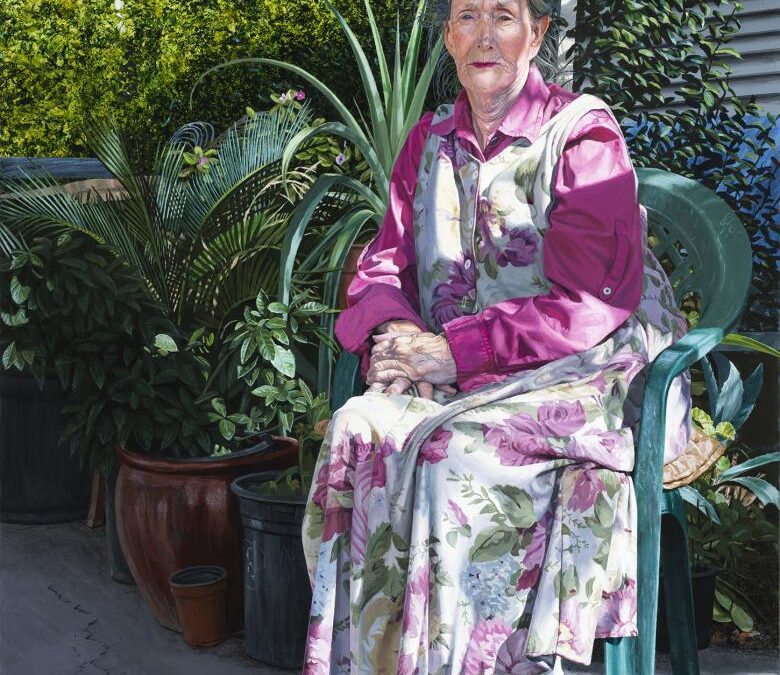Who is the woman in the portrait?
A couple of pictures hang side by side in the National Gallery of Ireland. Although everyone knows the person in one portrait - Sinéad O Connor, not many people know the person in the other portrait. But still, it could be argued that that woman had as strong an influence on the future of the country as Sinéad herself! In the portrait of the nondescript woman, she is sittiing in a plastic chair on the porch of her mobile home somewhere in the desert, perhaps in America. If you are of a certain age, it may well jog your memory when I tell you that that woman's name is Annie Murphy.
It could happen to a bishop!
When Annie Murphy came to Ireland from America in 1974, she hoped to start a new life and leave her previous life behind. Her marriage had ended in divorce and she was still grieving the loss of a child. Annie's father had a distant relationship with Bishop Eamonn Casey, and he wrote a letter to the bishop to help Annie when she arrived. Eamonn was an unusual bishop - a very serious man who liked to keep the spotlight on himself. He wanted the 'dulce vita', as they say in Italy. He was known for his love of fine wines and expensive meals. He loved to travel abroad. His heart was very much into fast cars and he was often seen racing around his diocese at high speed. He had the life of Riley, no doubt. There was only one thing missing. But now he would be able to fix that! Later, his critics would say that it was inevitable that illicit love was on the cards for this sinful bishop.
Anyway, after collecting Annie from the airport, the bishop gave her a room in his own house by the sea, called 'The Red Cliff House'. Annie was smitten with him, and vice versa. It's no wonder, then, that it wasn't long before he slipped into her room one night. The whole world knows what happened next! A secret relationship began between them. After a while, Annie expressed her concerns to Eamonn, questioning whether he would be able to continue the relationship. He answered her like this: "If God were here, he would approve of what I am doing." He told her she had to keep the relationship a secret, though.
But everything changed when she became pregnant. The fantasy world they were living came to an abrupt end. Eamonn suggested she give the child up for adoption, but Annie completely disagreed. In 1974, a year and a half after the beginning of their relationship, Annie moved back to the United States with her child, Peter. From then on for almost twenty years, the bishop sent money to Annie to support her son. But if the bishop thought that things would continue like that forever, he was wrong.
"Thrice you shall deny me"
In May 1988, Murphy's partner, Arthur Pennell, visited the bishop and informed him that Peter wanted to spend some time with him. The bishop gave him an answer that started a real upheaval, which would bring the bishop down in the short term, and would have a major long-term impact on the Catholic church in Ireland. This is what he said, according to Peter Murphy who heard it from Arthur himself: “Annie was a prostitute who would have sex with the whole town. And Peter is not my child.” That was the fatal blow and when Pennell returned to New York, Annie brought a case to court against the bishop, saying that she suffered because of the bishop's actions. When the case ended in 1990, Bishop Casey had to pay $98,000, but he did not admit that he was Peter's father. When the bishop went to New York to sign legal documents, he met Peter unexpectedly.
As Peter later recalled, it was a five-minute conversation and the bishop was "out the door". He felt that his father treated him as a "little clerical error in his life". From then on he decided that he would force his father to confess the truth publicly.
Annie Murphy then demanded that the bishop pay for Peter's education, who was attending university. The bishop did not give her a red penny, and Annie decided to make the story available to the public.
The bishop's version
Pennell and Murphy contacted the 'Irish Times' in 1992. The story about the bishop's son quickly spread across the front pages of the newspapers and shortly afterwards, the Vatican announced that Eamonn Casey had resigned as bishop of Galway, although he would remain in the priesthood. Soon after, Eamonn Casey left Ireland on an Aer Lingus flight to New York, where he issued a statement admitting that he was Peter Murphy's father and that he had used money from diocesan funds to support him. After six months, he was sent to Ecuador as a missionary priest for six and a half years. That was his "punishment". He then spent time in England, and was not allowed to return to Ireland until 2006.
Excellent response!
In 1993 a book was published, written by Annie Murphy and the author Peter de Rosa called: 'Forbidden Fruit: The True Story of My Secret Love Affair With Ireland's Most Powerful Bishop.' Annie detailed her relationship with Bishop Casey, and she didn't hide anything. The whole country was taken aback, but especially the older generation, who were loyal to the Catholic Church. This was a betrayal of trust to the country, and there was no turning back. In 1993 a book was published, written by Annie Murphy and the author Peter de Rosa called: 'Forbidden Fruit: The True Story of My Secret Love Affair With Ireland's Most Powerful Bishop.' Annie detailed her relationship with Bishop Casey, and she didn't hide anything. The whole country was taken aback, but especially the older generation, who were loyal to the Catholic Church. This was a betrayal of trust to the country, and there was no turning back.
When Annie Murphy was back in Ireland for her book launch, she was invited to the 'Late Late Show', with Gay Byrne. In that interview, Gay Byrne took the side of the church, implying that it was she who tempted the bishop. Gaybo ended the interview by saying: "Let's end on a note that says 'if your son is half as good as his father, he wouldn't be too bad.'
"I'm not doing too bad either, Mr Byrne," replied Annie Murphy, before leaving the show without shaking the host's hand. That moment would live as a decisive moment in the country's history. Although we didn't know it at the time, we were just at the beginning of an era of scandals for the Catholic Church in Ireland and around the world. The Church would never have such power in Ireland again, after its terrible betrayal of our trust.





